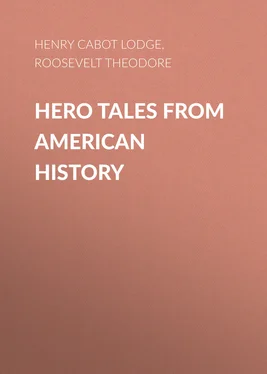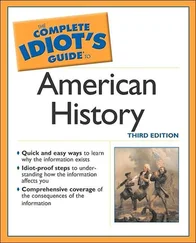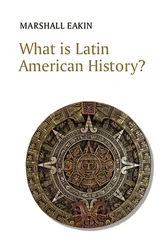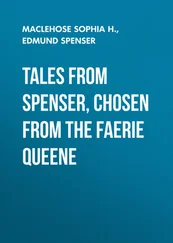The march had been so quick and the attack so sudden that Ferguson had barely time to marshal his men before the assault was made. Most of his militia he scattered around the top of the hill to fire down at the Americans as they came up, while with his regulars and with a few picked militia he charged with the bayonet in person, first down one side of the mountain and then down the other. Sevier, Shelby, Campbell, and the other colonels of the frontiersmen, led each his force of riflemen straight toward the summit. Each body in turn when charged by the regulars was forced to give way, for there were no bayonets wherewith to meet the foe; but the backwoodsmen retreated only so long as the charge lasted, and the minute that it stopped they stopped too, and came back ever closer to the ridge and ever with a deadlier fire. Ferguson, blowing a silver whistle as a signal to his men, led these charges, sword in hand, on horseback. At last, just as he was once again rallying his men, the riflemen of Sevier and Shelby crowned the top of the ridge. The gallant British commander became a fair target for the backwoodsmen, and as for the last time he led his men against them, seven bullets entered his body and he fell dead. With his fall resistance ceased. The regulars and Tories huddled together in a confused mass, while the exultant Americans rushed forward. A flag of truce was hoisted, and all the British who were not dead surrendered.
The victory was complete, and the backwoodsmen at once started to return to their log hamlets and rough, lonely farms. They could not stay, for they dared not leave their homes at the mercy of the Indians. They had rendered a great service; for Cornwallis, when he heard of the disaster to his trusted lieutenant, abandoned his march northward, and retired to South Carolina. When he again resumed the offensive, he found his path barred by stubborn General Greene and his troops of the Continental line.
THE STORMING OF STONY POINT
In their ragged regimentals
Stood the old Continentals,
Yielding not,
When the grenadiers were lunging,
And like hail fell the plunging
Cannon-shot;
When the files
Of the isles
From the smoky night encampment bore the banner of the rampant Unicorn,
And grummer, grummer, grummer, rolled the roll of the drummer,
Through the morn!
Then with eyes to the front all,
And with guns horizontal,
Stood our sires;
And the balls whistled deadly,
And in streams flashing redly
Blazed the fires;
As the roar
On the shore
Swept the strong battle-breakers o'er the green-sodded acres
Of the plain;
And louder, louder, louder cracked the black gunpowder,
Cracked amain!
—Guy Humphrey McMaster.
One of the heroic figures of the Revolution was Anthony Wayne, Major-General of the Continental line. With the exception of Washington, and perhaps Greene, he was the best general the Americans developed in the contest; and without exception he showed himself to be the hardest fighter produced on either side. He belongs, as regards this latter characteristic, with the men like Winfield Scott, Phil Kearney, Hancock, and Forrest, who reveled in the danger and the actual shock of arms. Indeed, his eager love of battle, and splendid disregard of peril, have made many writers forget his really great qualities as a general. Soldiers are always prompt to recognize the prime virtue of physical courage, and Wayne's followers christened their daring commander "Mad Anthony," in loving allusion to his reckless bravery. It is perfectly true that Wayne had this courage, and that he was a born fighter; otherwise, he never would have been a great commander. A man who lacks the fondness for fighting, the eager desire to punish his adversary, and the willingness to suffer punishment in return, may be a great organizer, like McClellan, but can never become a great general or win great victories. There are, however, plenty of men who, though they possess these fine manly traits, yet lack the head to command an army; but Wayne had not only the heart and the hand but the head likewise. No man could dare as greatly as he did without incurring the risk of an occasional check; but he was an able and bold tactician, a vigilant and cautious leader, well fitted to bear the terrible burden of responsibility which rests upon a commander-in-chief.
Of course, at times he had some rather severe lessons. Quite early in his career, just after the battle of the Brandywine, when he was set to watch the enemy, he was surprised at night by the British general Grey, a redoubtable fighter, who attacked him with the bayonet, killed a number of his men, and forced him to fall back some distance from the field of action. This mortifying experience had no effect whatever on Wayne's courage or self-reliance, but it did give him a valuable lesson in caution. He showed what he had learned by the skill with which, many years later, he conducted the famous campaign in which he overthrew the Northwestern Indians at the Fight of the Fallen Timbers.
Wayne's favorite weapon was the bayonet, and, like Scott he taught his troops, until they were able in the shock of hand-to-hand conflict to overthrow the renowned British infantry, who have always justly prided themselves on their prowess with cold steel. At the battle of Germantown it was Wayne's troops who, falling on with the bayonet, drove the Hessians and the British light infantry, and only retreated under orders when the attack had failed elsewhere. At Monmouth it was Wayne and his Continentals who first checked the British advance by repulsing the bayonet charge of the guards and grenadiers.
Конец ознакомительного фрагмента.
Текст предоставлен ООО «ЛитРес».
Прочитайте эту книгу целиком, на ЛитРес.
Безопасно оплатить книгу можно банковской картой Visa, MasterCard, Maestro, со счета мобильного телефона, с платежного терминала, в салоне МТС или Связной, через PayPal, WebMoney, Яндекс.Деньги, QIWI Кошелек, бонусными картами или другим удобным Вам способом.
John Richard Green.












